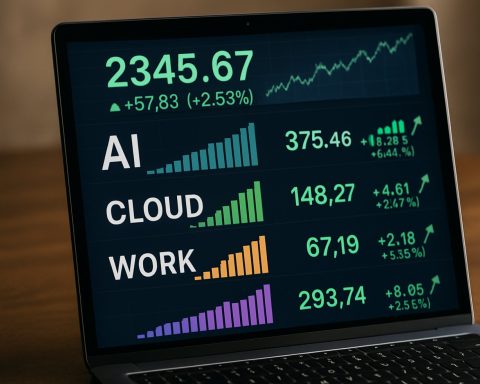- “Saturday Night Live” features James Austin Johnson’s satirical impression of ex-President Donald Trump, focusing on nostalgia for past economic policies.
- The parody critiques Trump’s tariff-heavy approach, likened to historical protectionist errors such as the Smoot-Hawley Tariff Act of 1930.
- Johnson’s comedic portrayal amplifies the humor in misconstruing complex economic strategies, like tariffs, as beneficial when they echo past mistakes.
- The skit illustrates the cyclical nature of economic policies and the risks of repeating history’s errors.
- By blending comedy with critique, SNL invites the audience to reflect on the real-world impact of such policies, highlighting the power of satire to reveal deeper truths.
A chilly Saturday evening in New York City is ordinary enough, except inside the iconic halls of 30 Rockefeller Plaza, where the sharp wit of “Saturday Night Live” electrifies the atmosphere. The stage, though empty at first, soon welcomes a nervously anticipated performance as one of its standout impressionists, James Austin Johnson, saunters on as ex-President Donald Trump.
Curling the corners of his mouth into a signature smirk, Johnson dives headfirst into a satirical monologue on America’s economic past—echoing a call to “Make America Great Depression Again.” This clever skewering of Trump’s economic nostalgia, packaged as a liberation day rife with tariffs, invites chuckles peppered with truth.
Trump’s tariff-heavy speech breeds comedy, a tragicomedy almost, where the concept of tariffs is painted as the ‘star policy’—a ‘terrific idea’ gone awry. Johnson, as Trump, paints an economic odyssey that’s less about advancement and more a regurgitation of dated practices: the president’s mystical interpretation of Smithian economics. Numbers flash across an imagined screen, reminiscent of disconnected data sets from the show “Severance,” representing ample confusion rather than comprehension.
“Great depression,” oozes Trump-Johnson, elevating the dire phrase to new comedic heights—not the economic catastrophe it once was but a spectacle, a fantastical reality show. On SNL’s grand canvas of caricature, the audience becomes part participant, part victim of this orchestrated chaos. Tariffs, in this narrative, serve as the whimsical backbone of economic strategy, a pastiche of promises preordained to ricochet disaster, much like the Smoot-Hawley Tariff Act of 1930.
Those ill-fated days, when protectionist policies spiraled into global economic distress, become fodder for ridicule. SNL’s script transports viewers through the echoing halls of history, reminding us of the precarious nature of cyclical mistakes—the inevitable clash of nationalism and economic collaboration being laid bare in comic proportions. A not-so-subtle jab at protectionism extends to an anachronistic misperception of trade, where reciprocal relations craft a fundamentally flawed geopolitical landscape.
Johnson’s interpretation, imbued with exaggerated flair, stirs the familiar pot of international tension. The mention of South Africa, veiled in confusion and shaking heads, stirs up laughter as the fictional Trump conjures arbitrary tariffs, sparking scenarios so bizarre, they seem almost plausible. Cue Mike Myers resurrecting Elon Musk; hilarity ensues as the fictional tech guru unveils the auto industry’s first self-destructive marvel—the Tesla Model V, an invention perfectly suited for SNL’s absurd universe.
The SNL parody uses humor as a reflective tool, amplifying the stakes of economic policies while distilling them through a lens of satire. With every ripple of laughter, the show’s timely sketch serves a greater purpose—reminding us that revisiting history’s errors, packing them into policies adorned with nostalgia, risks repeating cycles of regression.
The takeaway? Comedy, in its pure form, makes us pause, think, and react—awakening the audience to the genuine impact of policies, no matter how abstract or deliberately obfuscated by humor. In the world of SNL, comedic insight reigns supreme, delivering its own brand of unavoidable truth.
What “SNL” Teaches Us About Economic Policies Through Comedy
“Saturday Night Live” (SNL) often serves as a cultural barometer, using humor to provide insightful commentary on current events and public figures. Through skits like James Austin Johnson’s portrayal of Donald Trump, the show offers a unique lens on complex topics—such as economic policies—that might otherwise be dry or difficult to grasp. Here’s a deeper dive into how SNL effectively communicates these ideas and why its comedic storytelling holds such significant weight.
Real-World Use Cases of SNL Satire
1. Educating the Public: SNL simplifies the intricacies of economic policies through humor, making complex subjects accessible. The portrayal of tariffs as a confusing economic strategy serves as a reminder of past mistakes, such as those exemplified by the Smoot-Hawley Tariff Act of 1930, which exacerbated the Great Depression.
2. Cultural Reflection: The sketch illustrates how comedy can spotlight cyclical mistakes in economic thought, prompting viewers to reflect on current political discourse and historical parallels.
3. Influencing Public Perception: By portraying exaggerated scenarios, such as tariffs on unlikely countries and fictional products like the self-destructive Tesla Model V, SNL critiques current policies and potentially influences public opinion by framing them in a comical light.
Economic Policy Insights
– Tariffs and Protectionism: Historically, tariffs have been used as protectionist tools that often lead to economic downturns. The humor in SNL’s sketch around tariffs sarcastically hints at their potential for causing more harm than good in a globally connected economy.
– Preventative Comedy: By recalling historical errors, the sketch underscores the importance of learning from the past to avoid similar economic pitfalls.
The Role of Humor in Political Commentary
– Engagement through Comedy: By presenting potentially dry topics with humor, SNL ensures broader audience engagement, effectively communicating critical commentary without alienating viewers with technical jargon.
– Amplifying Truth: Comedy often provides a veil through which harsher realities may be palatable, nudging the audience to discern real-world implications behind the satire.
How-To Steps for Engaging with Satire
1. Identify the Core Message: Reflect on the historical or current event being referenced and recognize the underlying criticism or lesson.
2. Research Context: Understand the actual economic policies or events that are being satirized to appreciate the depth of the joke.
3. Enjoy the Exaggeration: Embrace the absurdity as a tool for emphasizing key points that might otherwise go unnoticed in serious discourse.
Actionable Recommendations
– Stay Informed: Regularly follow credible news sources to keep up-to-date with current events that are often subjects of SNL sketches.
– Balance Humor and Fact: When consuming satirical content, take time to understand both the comedic and factual aspects, enabling a more comprehensive grasp of the issue.
– Encourage Discussion: Use skits as conversation starters to engage others in discussions about the important issues they highlight, promoting a more informed populace.
The duality of humor and serious reflection in SNL’s content encourages audiences not only to laugh but to ponder, ensuring that comedy remains a powerful medium for cultural and political discourse.
To learn more about cultural commentary and its impact, visit NBC.









